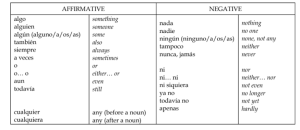6 Affirmative, negative and indefinite expressions
Affirmative and negative words

Patterns for expressing negation
- The negative ‘no’ is always placed directly before the verb, except when the sentence contains a reflexive or object pronoun. Compare the following examples of affirmative and negative patterns:
|
Affirmative |
Negative |
|
Yo hablo. I speak. |
Yo no hablo. I don’t speak. |
|
Quiero levantarme. I want to get up. |
No quiero levantarme. I don’t want to get up. |
|
Estoy lavándome la cara. Me estoy lavando la cara. I am washing my face. |
No estoy lavándome la cara. No me estoy lavando la cara. I am not washing my face. |
- In addition to the negative no, any negative may be placed before the verb in order to form the negative.
|
Nadie quiere ir. |
Nobody wants to go. |
|
Nunca hablamos con ella. |
We never talk to her. |
|
Tampoco baila Antonio. |
Antonio doesn’t dance either. |
- If a negative word is placed after the verb, no must be placed before the verb. Unlike English, the double negative is required in Spanish.
|
Nadie debe gritar. No debe gritar nadie. |
Nobody ought to shout. |
|
Ni él ni ella quiere bailar. No quiere bailar ni él ni ella. |
Neither he nor she wants to dance. |
|
No pasa nada aquí. |
Nothing is happening here. |
- Unlike English, Spanish can have two or more negative words in a single sentence and maintain a negative meaning. Once a negative is placed before the verb, all indefinite words that follow the verb must also be negative.
No vi a nadie. I did not see anyone.
Nunca hace nada por nadie. He never does anything for anyone.
- Alguien/nadie and alguno/ninguno must be preceded by the personal a when they function as direct objects.
Veo a alguien en el pasillo.I see someone in the hall.
No conozco a ninguno de ellos.I don’t know any of them.
- As adjectives, alguno/ninguno agree in number and gender with the nouns they modify. They shorten to:
algún/ningún before masculine singular nouns. Ningunos/ningunas are not used very often.
Hay algunos chicos en esa clase.There are some guys in that class.
No tengo ningún amigo.I don’t have any friends.
- Spanish no cannot be used as an adjective.
no child = ningún niño no person = ninguna persona
- Algo/nada can be used as adverbs to modify adjectives.
Pues, sí es algo interesante.(somewhat, a little bit) No, no es nada interesante. (not…at all)
English more than (anything, ever, anyone) is expressed with negatives in Spanish: más que nada, más que nunca, más que nadie
- Cualquier(a) means any in an affirmative sentence. Cualquier is used in front of a noun, while cualquiera is used after a noun.
Cualquier revista/libro/señora/señor.
Una revista/Un libro/Una señora/Un señor cualquier
- Cualesquieras is the plural form, but it is rarely used.
Cualquiera que sea la causa, su actitud es inaceptable.
Cualesquiera que sean las causas, su actitud es inaceptable.
Exercises
Ej. 1 Cambia las frases siguiendo los modelos.
e.g. Algo queremos hacer. →Nada queremos hacer.
Queremos hacer algo. →No queremos hacer nada.
- Hay algo interesante en el menú.
- Tienen algunos platos típicos.
- El profesor cena allí también.
- O Carmen o Michael puede traer la sopa.
- Mis amigos siempre almuerzan allí.
- Preparan algo especial para grupos grandes.
- Siempre hacen platos nuevos.
- Y también sirven paella, mi plato favorito.
- Voy a ir al club de ajedrez.
- Bebo siempre agua mineral.
- Me gustan muchísimo las matemáticas.
- Tocan la guitarra y el piano.
- Habla con mucha gente
Ej. 2 Federico es una persona negativa pero su novia Evita es muy positiva. Escribe las reacciones positivas de Evita a los comentarios de Federico.
- No quiero comer nada. La comida aquí es mala. → Pues, yo sí …
- Nadie viene a atendernos. → Pero aquí viene ..
- Nunca cenamos en un restaurante bueno. → Yo creo que…
- No hay ningún plato interesante. → Aquí hay…
Ej. 3 Contesta las preguntas usando Yo tampoco o Yo también, según convenga.
- Yo no tengo hambre. ¿Y tú?
- Yo no tengo dinero. ¿Y tú?
- Yo ceno a las seis. ¿Y tú?
- Voy a tomar café. ¿Y tú?
Ej. 4 Contesta las preguntas negativamente.
- ¿Tienes algo en tus bolsillos?
- ¿Tienes algo que declarar en tu equipage?
- ¿Hay algo nuevo en el cine?
- ¿Viste algo barato en la tienda de recuerdos?
- ¿Encontraste algo interesante en la librería?
- ¿Vas a hacer algo el domingo que viene?
- ¿Perdiste tu dinero y tu pasaporte?
- ¿Olvidaste tus gafas de sol y tu traje de baño?
- ¿Dejaste tu billetero y tu pasaporte en el hotel?
- ¿Perdiste la guía y el mapa?
- ¿Comiste bocadillos y patatas fritas?
- ¿Conociste a muchos españoles en Cantabria?
- ¿Fuiste a casa de muchas personas en Santander?
- ¿Viste a muchos amigos tuyos en Laredo?
- ¿Visitaste a mucha gente en Llanes?
- ¿Escribiste a tus padres desde Santander?
Ej. 5 Contesta las acusaciones usando nunca.
|
1. ¡Siempre dejas tu dinero en el hotel! |
2. |
¡Siempre pierdes tus llaves! |
|
3.¡Siempre olvidas tus gafas! |
4. |
¡Siempre coges mis cosas! |
|
5.¡Siempre te comes mis caramelos! |
6. |
¡Siempre mientes! |